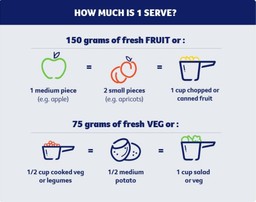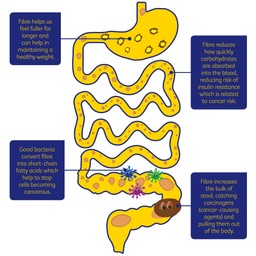The short answer is ‘yes’ and ‘in both ways’. Eating a healthy diet can help reduce your risk of developing cancer, while consuming a poor diet can increase your cancer risk. Let’s explore how.
Each year, eating a poor diet causes more than 6,700 cancer cases in Australia including cancer of the bowel, liver, oesophagus and stomach.
While there are no specific “super foods” that can provide protection against cancer, and not all cancers are preventable, we can share three science-proven steps you can take to help lower your risk.
1. Eat more fruit and vegetables
Did you know at least 9 in 10 adults do not eat enough vegetables? Fruit and vegetables contain nutrients which can be protective against diet-related cancers, which is why it’s so important to include them as a part of a healthy diet.
Fruit and vegetables also play an important role in weight management and lowering your risk of developing obesity-related cancers, as they are low in fat and kilojoules, and high in fibre, keeping you feeling fuller for longer.
The Australian Guide to Healthy Eating recommends consuming at least two serves of fruit and five serves of vegetables every day as part of a balanced diet.
Source: Cancer Council Australia
So how can you increase your fruit and vegetable intake? Here are eight ways to eat more fruit and vegetables:
- Snack on veggie sticks with hummus or vegetable-based dips.
- Bake veggie loaded muffins or savoury scones.
- Try a new fruit or vegetable each week and enjoy what is in season.
- Add canned beans to your salad.
- Steam frozen veggies for convenience.
- Include veggies with your brekkie and lunch.
- Add extra veggies to all your recipes such as sauces, bakes, pasta and curry dishes.
- Choose fresh fruit instead of sweets or a glass of juice.
Need some inspiration to get you started? Check out our collection of healthy recipes.
2. Choose high-fibre wholegrains
As well as fruit and vegetables, other great sources of fibre include wholemeal or wholegrain breads or wraps, wholemeal couscous, quinoa, brown rice, wholemeal pasta, high-fibre breakfast cereals, muesli, and oats.
Dietary fibre helps reduce colorectal cancer risk in four ways:
Are you getting enough dietary fibre? Download our high-fibre recipes, and check out our easy high-fibre swaps, high-fibre meal plan and shopping list to boost your fibre intake here.
3. Eat more fish and less red and processed meats
There is convincing evidence that eating red meat and processed meat increases the risk of colorectal (bowel) cancer, with the more you eat, the higher the risk.
Reducing the amount of red meat you eat to less than 455 grams per week; avoiding processed meats like ham, bacon, salami and frankfurts; and eating more fish has been shown to lower this risk, which is great news!
Instead, choose lean cuts of meat and chicken, and eat more fish and plenty of plant-based foods such as fruit, vegetables, beans, and wholegrain cereals.
A higher intake of fatty fish like sardines, salmon, mackerel, and herring is also linked to a lower risk of developing breast cancer, so try and eat these at least twice per week.
The bottom line
To reduce your risk of diet and obesity-related cancers:
- eat plenty of fruits, vegetables and wholegrain foods which are high in fibre
- limit your consumption of cooked red meat to less than 455 g per week
- avoid eating processed meats such as ham, bacon, salami and frankfurts
- eat fatty fish like sardines, salmon, mackerel and herring twice per week.
Content developed by Mollie van Rhoda, Cancer Council SA Community Education Project Officer and Karissa Deutrom, Cancer Council SA Accredited Practising Dietitian.
References:
- Australian Institute of Health and Welfare (2019) Poor diet. AIHW, Australian Government.
- National Health and Medical Research Council (2013) Australian Dietary Guidelines. Canberra: National Health and Medical Research Council.
- Ubago-Guisado et al 2021. Evidence Update on the Relationship between Diet and the Most Common Cancers from the European Prospective Investigation into Cancer and Nutrition (EPIC) Study: A Systematic Review. Nutrients. Oct 13;13(10):3582. doi.org/10.3390/nu13103582
- Whiteman et al 2015. Cancers in Australia in 2010 attributable to modifiable factors: summary and conclusions. Aus NZ J Pub Health. doi.org/10.1111/1753-6405.12471
- Yang et al 2021. A Critical Review of the Effect of Dietary Fiber Intake on the Prevention of Colorectal Cancer in Eastern Asian Countries. J Healthc Eng. Jan 16. doi.org/10.1155/2021/6680698

